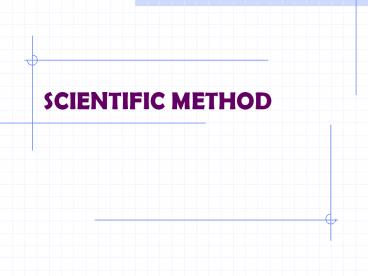SCIENTIFIC METHOD - PowerPoint PPT Presentation
1 / 10
Title:
SCIENTIFIC METHOD
Description:
SCIENTIFIC METHOD SCIENTIFIC METHOD The scientific method is an organized way to solve a problem or answer a question. You probably use it every day without even ... – PowerPoint PPT presentation
Number of Views:165
Avg rating:3.0/5.0
Title: SCIENTIFIC METHOD
1
SCIENTIFIC METHOD
2
SCIENTIFIC METHOD
- The scientific method is an organized way to
solve a problem or answer a question. - You probably use it every day without even
thinking about it.
3
The Problem / Purpose
- What do you want to find out? What problem are
you trying to solve? - State your problem or purpose as clearly as
possible. - Does your problem have more than one part?
4
Observations / Research
- An observation is when you use your senses to
gather information about your problem. - Use your past experiences as a resource.
- Research is an important part of gathering
information.
5
Observation vs. Inference
- Be careful not to confuse an observation with an
inference. - For example
- There is a long line at the restaurant. This is
an observation. - The food is good at the restaurant. This is an
inference.
6
Hypothesis
- An educated guess.
- A possible solution to the problem based on your
observations, research, and past experience.
7
Experiment
- An experiment is the way a hypothesis is tested
to see if it is correct. - Every experiment has variables, constants, and a
control.
8
Experiment (contd)
- The variable is the factor that is changed in an
experiment. - The constant(s) remains the same during the
entire experiment. - The control is our standard for comparison.
9
A Controlled Experiment
- For an experiment to be valid, it must be
controlled. - During a controlled experiment only one variable
is changed at a time. - The scientist must contrast an experimental
group with a control group. The two groups are
treated EXACTLY alike except for the ONE variable
being tested.
10
Theory / Conclusion
- Was your hypothesis correct? What did your
experiments tell you? Do you need to do further
experiments? - If your hypothesis was proven to be correct, it
becomes your theory. If your hypothesis was not
correct, you would change your hypothesis and
experiment again. http//pc65.frontier.osrhe.edu/h
s/science/hsimeth.htm































